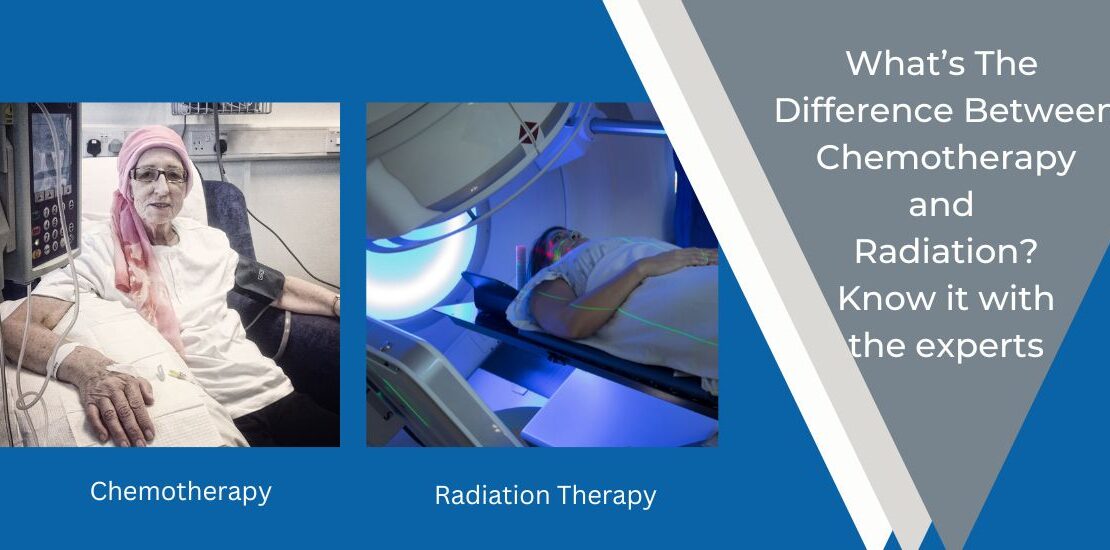- March 30, 2023
- Posted by: dramitgandhi
- Category: Uncategorized

Cancer is an encumbrance that demands ongoing treatment to keep it restrained. To avoid complications and growth of the tumor, experts recommend common treatment procedures, namely chemotherapy and radiotherapy. The therapies become a staple to a patient’s life as it prevents an uncontrollable growth of cancerous cells and tissues.
We understand that most of you are curious about the applications of chemotherapy vs. radiotherapy. Of course, both are effective in their way, but the treatments share certain differences, which are the topic of discussion for this article.
What is chemotherapy?
Chemotherapy is the treatment procedure in which a cell-killing cytotoxic drug is administered into the patient’s body. This anti-neoplastic drug travels throughout the body and targets cancer cells, either shrinking or killing them.
Cytotoxic drugs are given either orally or directly into the veins. The drug’s potential lies in its property to target cancer cells due to its rapid cell division. Cells in your hair undergo rapid divisions and can be damaged when exposed to the chemotherapy drug.
What is radiation therapy?
Radiotherapy utilizes ionising radiation to kill the cancer cells inside a patient’s body. The radiation contains protons which, when targeted on the tumor, jeopardize the DNA inside, eviscerating the cell division, which stops the growth, potentially killing the cancer cells. In addition, the radiation is only targeted to the cancer area, ensuring that the surrounding area’s functionality remains normal.
Radiation therapy is a quick and painless procedure that is often recommended solely or combined with surgeries depending on the condition of cancer. However, the side effect of the therapy is mostly localized, and it differs from patient to patient.
Are there side effects?
Side effects for both these therapies vary from patient to patient. The treatments are designed to kill cancer cells, and some of the healthy cells might get affected in the process. The following are the common side effects of the therapies in the discussion.
- Hair loss
- Vomiting and Nausea
- Changes in skin
- Tiredness
- Anemia
These side effects are normal, but they must be communicated to the doctor in charge, who can recommend medication to help you deal with it.
How are they administered?
Chemotherapy and radiation therapy demand multiple hospital visits and treatment plans. Depending on the area of cancer, these therapies can be administered in various ways.
The medical professional might administer chemotherapy by the following method:
- IV drip is a popular method of administering chemotherapy. A needle is connected directly to the vessel, and a tube carrying the drug is connected.
- A pill or a capsule containing the drug is designed to be administered orally.
- It can also be injected directly into the skin or muscle if needed.
Radiation therapy can be administered by the following method:
- External radiation is administered from outside the body; the machine aims the radiation as a beam toward cancer.
- Internal radiation or brachytherapy focuses on transferring a higher amount of radiation directly to the cancerous site of the body. In this process, a radiation seed is placed directly near the tumor and is later taken out when it has done its work.
- The less common systemic radiation therapy is where a radioactive antibody or iodine is swallowed or injected directly into the bloodstream. The radioactive substance then locates the tumors and disrupts them from the inside.
Which therapy do you need?
The choice between chemotherapy vs. radiotherapy lies in the hands of your doctor. First, proper assessment is needed to identify the stage of your cancer, which is a deciding factor when planning for the right therapy. Then, in most cases, your doctor will try out the options available, including a combination of surgery, chemo, and radiation therapy to remove the tumor.
A medical professional is the best judge for treatment planning, and trying out therapy options allows them to determine what will work best for the patient.
To get an in-depth idea about the treatment option, consult Dr. Amit Gandhi today. He is an excellent oncologist in Mumbai, offering comprehensive treatment to ensure his patients’ better quality of life.
